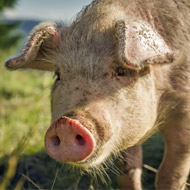Experts raise concern over ASF risk to US

The ASF risk to the US is deemed high because of the large volumes of agricultural produce that are currently imported from China.
Experts are warning that African swine fever (ASF) could reach the United States within less than a year unless security measures are stepped up.
According to The Guardian, biosecurity experts say that unless border protections are strengthened and high-risk pork imports are banned, the disease could cost the US economy an estimated $16.5bn in the first year alone.
Because of increasing concern over African swine fever, the US Department of Agriculture recently reviewed and strengthened its border protections. This included a restriction on pork or pork products from affected countries and the increased screening of passengers and baggage at points of entry.
But biosecurity specialist Dr Scott Dee told The Guardian that the measures do not go far enough.
“If we continue to do business as usual then [the US] will probably get ASF in a year. If we change some of our practices, which we are trying to do, then there’s a chance we can keep it out,” he said.
“If it got into the wild pig population it would be a disaster. I don’t even like to have the conversation about what we’d do if it got in because by that point we’ve already lost the war.”
African swine fever is a highly contagious disease of pigs that is often introduced to the herd through contaminated pork products or swill. The virus was first detected in China in early August and has since escalated in central and eastern Europe.
The risk to the US is deemed high because of the large volume of agricultural produce that is currently imported from China. Due to its strong resilience, experts say the virus can endure journeys of more than 30 hours and survive in food items.
In a bid control the disease in China, the government has closed down small farms, ceased the movement of pork and live pigs and shut down meat markets.



 The RCVS has announced a new version of its 1CPD mobile app, with enhanced features for veterinary surgeons and veterinary nurses to record their continuing professional development.
The RCVS has announced a new version of its 1CPD mobile app, with enhanced features for veterinary surgeons and veterinary nurses to record their continuing professional development.